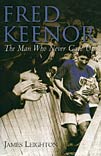 The Man Who Never Gave Up
The Man Who Never Gave Up
by James Leighton
DB Publishing, £16.99
Reviewed by Huw Richards
From WSC 298 December 2011
Inconvenient truth as it is for some of us, Cardiff City's FA Cup victory in 1927 remains the greatest achievement by any Welsh club. The associated quiz question will endure until somebody else takes the Cup out of England, while the date is to Cardiff fans what 1966 is to England followers.
Images of centre-half and captain Fred Keenor clutching the trophy fixed him in collective Cardiff memory as the symbol of the astonishing trajectory which peaked in 1927. He was the local boy wounded in the trenches who returned to see the club join the League in 1920, nearly win it in 1924 and lift the Cup three years later. Beating Arsenal in the 1927 final was not, as James Leighton rightly points out, a giant-killing – Cardiff were then at least as big a club. Yet by 1931 they were in Division Three South.
It is a wonder that Keenor was not previously treated at greater length than a fine essay by historian Martin Johnes. Leighton fills that Fred-sized – not quite 5ft 7in, but with a presence suggesting much more – gap to good effect. If the writing is ponderous,
the historical perspective compensates.
In contrast to biographies so dominated by their hero that all else loses focus, Keenor is painted against the context of his city, his club and the times.
We learn about Ninian Park's construction on a rubbish dump, how the Bluebirds were given their nickname and of the wartime "Footballers' Battalion". He appears alongside team-mates such as tragic final goalscorer Hugh Ferguson and goalkeeper Tom Farquharson, a former IRA man who was reputed to carry a gun and charged towards penalty-takers from the back of the net.
This vivid background helps define the central character. As Leighton writes: "He embodied the working-class masculine ideal… a local boy fighting tooth and nail for his side." Leighton also recognises that idols are not necessarily saints, quoting Dixie Dean's scathing opinion: "That fella would kick his own mother for a couple of bob. All he could do was kick or try to cripple somebody." Nor was Keenor's undoubted devotion to Cardiff or his idol status wholly unconditional. One of his two transfer requests came in the season that ended triumphantly at Wembley, while some fans took the post-1927 decline out on the most visible reminder of better times. While the horrors of the Welsh economy may have made their slump inevitable, Leighton suggests that Cardiff contributed by devoting the Cup windfall to ground improvements rather than renewing an ageing team.
The photos are terrific. The Molineux muck-heap for the 1927 semi-final rivals Keenor's omnipresent cigarette for best period detail, and his claim as Cardiff's greatest player seems unanswerable. John Toshack's achievements came elsewhere and Alf Sherwood's excellence in quieter times, while the indomitable Phil Dwyer was Keenor-lite. Keenor deserves the statue for which Cardiff fans are fundraising, and there's a tenner to be had from this Swans fan, provided they ask nicely.
Excellent review.